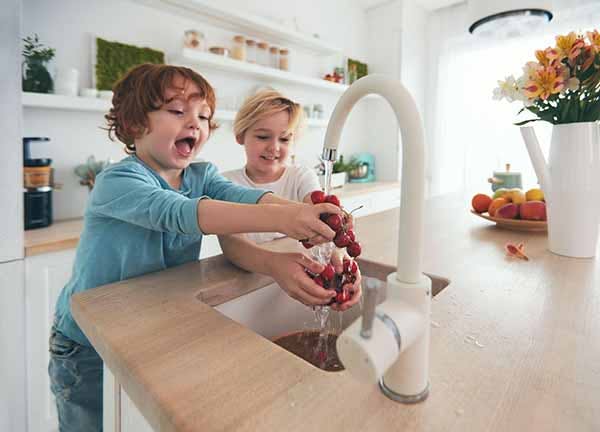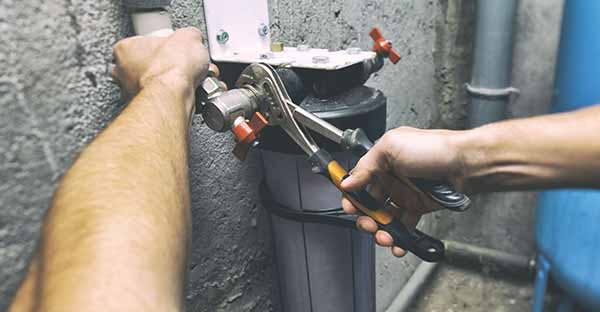June 2022
Home Water Filter Systems: Everything You Need to Know
Home water filter systems are designed to remove common contaminants such as bacteria, chloramine, fluoride, herbicides, industrial solvents, and hardness stemming from calcium, magnesium, and sediment. Water filtration can leave you with cleaner water and improved drinking water quality.
Filtered water is preferred for drinking, bathing, and cooking because it's healthier and better tasting. Filtering city water is one of the best ways to remove fluoride, chlorine taste, and other common contaminants.
We think you'll find that whole-house water filter systems are the preferred method for enjoying clean water.
This article will cover the important reasons for installing a home water filtration system, the various filtration system options to consider for your home, common questions about how these filters work, and related concerns.
What Are the Benefits of Having a Home Water Filtration System?
Filtered water is safer, healthier, and better for your home’s plumbing and appliances. A whole-house water filter system offers significant advantages, including the following:
- Mineral deposits are common in municipal water. Filtration systems typically come with a sediment filter, reducing calcium and limescale build-up in your water. Limescale and mineral residue leaves chalk-like stains and deposits that can accumulate in plumbing, pipes, and appliances; it can also impact the taste of your water. A quality whole-home water filter system can rid you of most of these minerals.
- You'll save money on purchasing bottled water and similar water-supply products, as your tap water quality will significantly improve in taste and purity. This advantage makes it more affordable to drink a sufficient amount of water, which is ideal for your health. At the same time, drinking filtered water from a reusable water bottle helps reduce plastic waste, which will lessen your carbon footprint.
- With better water flows, there are fewer plumbing issues that result from water contamination and mineral build-up in your pipes or water heater. Installing a home water filtration system may help you avoid more frequent calls to your plumber.
- Filtered water means fewer pesticides, disinfectants, traces of pharmaceuticals, manganese, and magnesium, among other minerals and contaminants in your water.
- Water filtration results in fewer skin irritations or reactions that occur from heavy metals and similar contaminants commonly found in hard water.
Overall, you'll find that the filter system removes harmful contaminants, resulting in great-tasting drinking water.
How Does a Home Water Filter System Work?
A water filtration system provides a surface that traps contaminants, sediment, and other minerals through activated carbon that functions as a magnet for volatile organic compounds such as lead. Inside the filter, the chemical reaction effectively reduces the contaminants, so that you’re left with clear, high-quality filtered water.
Various filters effectively improve your drinking water, including mechanical, sequestration, ion exchange, absorption, and reverse osmosis systems.
What Are the Three Types of Filtration?
The three main types of water filtration are reverse osmosis (RO), activated carbon, and cation exchange.
- RO systems use a high-pressure pump to force water through a semipermeable membrane, which effectively removes close to 99% of contaminants, so they’re flushed through the drain.
- Activated carbon filter systems remove pollutants, odors, and VOCs (volatile organic compounds) from your home water.
- Cation exchange filters work to remove contaminants from your home water by binding positively charged calcium and magnesium ions.
What Are the Most Common Water Filtration Systems?
Many whole-house water filter systems combine more than one filter type to remove water contaminants more effectively. While two of the most common water filtration systems include RO (reverse osmosis) and activated carbon, most whole-house filtration systems include a combination of more than two processes, including mixed-media filters, activated carbon, reverse osmosis, and UV purifiers.
UV filters are typically more budget-friendly, and are a popular choice because they’re easy to install, low maintenance, and treat home water effectively to remove bacteria, cysts, heavy metals, and herbicides.
While more expensive, reverse osmosis offers a unique home water filtration system that removes up to 99% of impurities.
Both water filter systems include an installation kit, are typically low maintenance, and offer a significant improvement to your home water.
Are Home Water Filtration Systems Worth It?
A whole-house water filter system is an excellent investment to significantly improve water quality for bathing, laundry, cleaning, and drinking. While it's a more expensive investment for your home, this extensive filtration system offers a sufficient supply of chlorine-free gallons of water for a family, including during peak hours.
The best whole-house water filter systems perform optimally when professionally installed by an experienced technician or plumber. The equipment must be compatible with your home and installed correctly to prevent malfunction and expensive repairs. While the initial installation costs more than smaller, sink-based models, you'll spend far less money and time on maintenance, repairs, and replacement parts later.
A quality home water filter system ensures that you'll benefit from contaminant-free water for all your household and personal needs. It's an excellent investment for homeowners and a significant way to reduce damage to your plumbing and water-based appliances.
A professional technician can also advise you on your new filtration system, including how to install a new filter, the best filtration media, filter cartridges, and durability.
Typically, a whole-house filtration system only requires minimal maintenance once a year so that you can enjoy high-quality water from the faucet to the showerhead.
Is It Better to Drink Tap Water or Filtered Water?
While many regions and municipalities claim their tap water is safe and healthy, municipal water supplies often contain minerals, bacteria, and contamination that the region's filtration systems may not entirely remove.
In rural areas, many homes rely on well water and natural springs. Water from these sources may contain more or fewer contaminants, depending on the region and pollution levels. Therefore, installing a home water filtration system may be a worthwhile investment.
The EPA regulates many contaminants, which improves water quality, though many others are not included that can harm your health and lifespan.
Which Filter Is Best for Drinking Water?
Three-stage filter systems are the top choice for drinking water, as this home system removes the highest percentage of bacteria, pollutants, and contaminants.
Are There Disadvantages to Home Water Filter Systems?
While filtered water systems offer high-quality results, there are a few disadvantages to consider before you invest.
- Not all water filter products are made equal, and some filtration systems require more frequent filter changes and maintenance, which may be costly and time-consuming. Be sure to do your research before buying and consider going with a filter replacement subscription program, such as the one offered by HomeWater.
- Some folks prefer to keep some minerals in their water, which are removed during the water treatment process if it contains a water softener component.
- Some water treatment systems alter the water pressure in your shower or faucet — it’s a good idea to check water flow before installing a filtration system.
Despite these minor drawbacks, we think you'll find that the advantages of filtered water systems far outweigh any disadvantages.
What Should I Look for When Buying a Water Filter?
Before choosing a whole-house water filter system, consider a few factors to help you make the best selection.
You'll want to look at the type of contaminants affecting your water supply and water hardness, water taste, whether your home water comes from a private well or municipality, and flow rate. Conducting a water test before purchasing is always a good idea.
Other things to consider are installation requirements, money-back guarantees, or lifetime warranties that your filtration system provider may offer.
Understanding these features makes it easier to decide which option would be the best whole-house water filter for your home.
Quality is one of the top criteria to consider when buying a water filter. It's essential to purchase the best filtration system based on your budget while considering all options. There are some crucial factors to review when you choose a product, including:
- The cost of installation and maintenance, including filter changes (cost and frequency) and hiring a technician to install the system.
- The ease of installation, and whether you can change filter cartridges on your own, or if professional assistance is needed.
- Filtration rate and the quality of water you'll enjoy with the removal of many contaminants.
- The plumbing costs you'll save due to less build-up of minerals and residue in your home's pipes and plumbing system.
If you reside in a region where contamination is higher than average, investing in a whole-house water filtration system may be costly, though invaluable for protecting your health.
How Long Does It Take to Install a Home Water Filtration System?
The time frame for installing a whole-house water filter system can take around two hours, based on your home, the plumber, and any additional work that may be required.
If you choose to go the DIY route and install your water filtration system on your own, the process may take longer, based on your experience.
Smaller under-sink filter systems are often easy to install with the included instructions.
If you're purchasing a whole-house filtration system for the first time, we recommend you consult with a professional plumber, technician, or water filtration expert at HomeWater.
Can I Install My Whole-House Water Filter Outside?
The best place to install a water filter is where your main water shut-off valve is. You may find this valve in a basement, utility closet, or garage. In most cases, a whole-house filter system must be installed on the exterior of your home, either because there's not sufficient space indoors or the main shut-off valve is located on the outside of the house. If your home water filter system will be exposed to the elements, you may want to consider some kind of housing unit for it.
Which Home Water Filtration Systems Are Best?
The best whole-house water filter can come in one-stage, two-stage, or three-stage options, increasing filtration capabilities with each added stage. These systems can also incorporate water softeners, such as the HomeWater Salt-Free Conditioner to reduce water-hardening metals and minerals.
Do I Need a Special Home Water Filter for Well Water?
Depending on your home, you may find that having a private well means having hard water, since your water source comes from underground.
Having a whole-home water filter system that includes the advantages of a salt-free water conditioner will improve the taste and quality of your water, but we recommend UV and a custom configuration to filter for well-water for contaminants.
A good sediment filter will protect your family from dirt, manganese, rust, copper, calcium, magnesium, and solids.
Improve Your Home WaterWith a Complete Filtration System
The benefits of a water filtration system go way beyond the initial costs and maintenance required to enjoy the highest-quality water for your home. In addition, we have a replacement filter subscription program at Home Water, making it inexpensive and easy to keep your system in good working condition.
Home water filtration systems for your home are among the most important investments you'll make in purifying your water source.
No matter what type of filtration system you choose, you'll find that a quality whole-house water filter will provide many benefits to your health. These advantages include preventing pipe corrosion and related damage and residue in sinks, bathtubs, and other areas of your home, thanks to the removal of chloramines, chlorine, and other contaminants.
Contact us at Home Water to inquire about easy installation of our home water filtration systems and how we can improve your home water today.
Brought to you by homewater.com
All images licensed from Adobe Stock.
Featured Image

